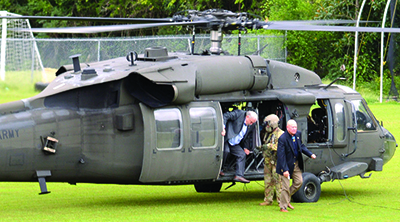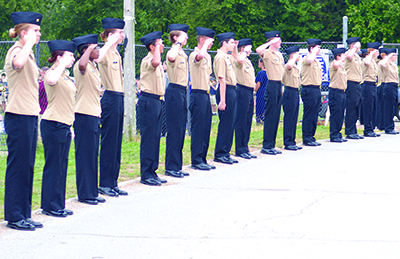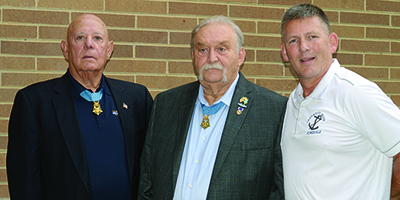FHS, NJROTC ... Salute Medal of Honor duo
Of the 65 living Congressional Medal of Honor recipients in the United States, two of those, Gary Littrell and Michael Fitzmaurice, shared their stories, insights and wisdom during a presentation in Farragut High School’s Vickie B. Wells Auditorium Wednesday, Sept. 7.
“This is an honor of a lifetime,” FHS principal Dr. John Bartlett, a retired U.S. Marine, said as he introduced the guests of honor. “This is the highest decoration award given to anybody in our nation for their bravery in the battlefield.
“It’s one of the greatest privileges I will ever have because … these heroes don’t wear capes, they don’t wear superman costumes, but they do step into history,” he added.
“Now, it’s your turn,” Fitzmaurice told the students. “You guys are going to be the future. We want our country back, so get in there and get it done.”
“Look in the mirror and ask ‘who am I?’” Littrell said, as he challenged the students to live up to the Medal of Honor core values: courage, commitment, sacrifice, integrity, citizenship and patriotism.
”Each one of you can provide these core values to your life every day,” he added.
The presentation was part of a Character Development Program provided by the Congressional Medal of Honor Society, which held its annual Medal of Honor Celebration Tuesday through Friday, Sept. 6-10, in Knoxville Convention Center — only the second time it was hosted in Knoxville. The first time was in 2014.
Besides FHS, the Society had nine other speaking programs with fellow Medal of Honor recipients, which included Bearden High School and Knoxville Catholic High School.
Littrell and Fitzmaurice arrived in a BlackHawk helicopter on the school’s practice field, welcomed by music from FHS’s Marching Admirals band and a line of salutes from several NJROTC cadets.
When Fitzmaurice earned the Medal of Honor, he was an Army Specialist 4th Class.
Heroes’ stories told
Both Fitzmaurice and Littrell earned their recognition during the Vietnam War and received their medals the same day from then President Richard M. Nixon in 1973.
“Sixty years ago, Gary and I were both where you guys are, wondering what we were going to do with our lives,” Fitzmaurice said.
“In 1971, I had just turned 21,” added Fitzmaurice, then a Specialist 4th Class, who was in the 3rd Platoon, Troop D. He recalled being sent to Khesanh, to guard the airstrip. He and other soldiers were occupying a bunker when a company of North Vietnamese infiltrated the area.
“I’d had no more got in (the bunker) when the rockets and mortars and stuff started coming in. I was already dressed, and my buddy Phil — I think he was next on guard — so we ran out.”
Encountering five North Korean “sappers,” they shot the enemy and got back to the bunker. He was told there was a company of North Vietnamese — about 300 — “… they are actually what you would call suicide bombers … they were highly trained,” he said.
Fitzmaurice saw the enemy throw three grenades into his bunker. According to the Congressional Medal of Honor Society website, “Realizing the imminent danger to his comrades, and with complete disregard for his personal safety, he hurled two of the charges out of the bunker.”
“The third, I couldn’t get out, so I just covered it up,” Fitzmaurice said.
He had thrown his flak vest and himself over the remaining charge. The website stated, “By this courageous act he absorbed the blast and shielded his fellow soldiers.”
Even though he was seriously injured, Fitzmaurice “charged out of the bunker and engaged the enemy until his rifle was damaged by the blast of an enemy hand grenade,” the website stated. “While in search of another weapon, Sp4c. Fitzmaurice encountered and overcame an enemy sapper in hand-to-hand combat.
“Having obtained another weapon, he returned to his original fighting position and inflicted additional casualties on the attacking enemy,” according to the website. “Although seriously wounded, Sp4c. Fitzmaurice refused to be medically evacuated, preferring to remain at his post.”
Littrell, a retired U.S. Army Command Sgt. Major, joined at age 17. While later serving as an advisor to the Army of the Republic of Vietnam’s Ranger units in April 1970, “I got my orders to take my Vietnamese Rangers … to a Special Forces base camp that got overrun near Dak Seang.
“Most of them were dead or wounded,” he recalled. The Vietnamese Ranger battalion consisted of 473 men, along with four advisors.
“Our mission was to penetrate their compound,” Littrell further recalled. “The enemy that was attacking consisted of roughly 5,000 North Vietnamese hard-core fighters.
“They just threw a horseshoe around my hill and started pounding on us, but I had the high ground. I had artillery; I had air support, so we beat them down. It took us four days and four nights. … at the end, out of the 473, I had 41 walking wounded left; and out of the four advisors, it was me (left). The ones who survived thought during those four days that I went beyond the call of duty.”
“I didn’t,” Littrell observed. “I was doing my job. I was a Sergeant 1st Class.”
The Medal of Honor citation reads: “For conspicuous gallantry and intrepidity in action at the risk of his life above and beyond the call of duty … During the ensuing four days, Sfc. Littrell exhibited near superhuman endurance as he single-handedly bolstered the besieged battalion.
“Repeatedly abandoning positions of relative safety, he directed artillery and air support by day and marked the unit’s location by night, despite the heavy, concentrated enemy fire.
“His dauntless will instilled in the men of the 23d Battalion a deep desire to resist,” the citation further read. “Assault after assault was repulsed as the battalion responded to the extraordinary leadership and personal example exhibited by Sfc. Littrell ... (he) cared for the wounded and shouted encouragement to the Vietnamese in their own language. ...”





